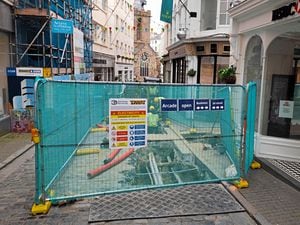A politician who has hit the ground running
SOME new deputies enter the Assembly having made a lot of noise at election time, before quietly taking a back seat for the next few years.
SOME new deputies enter the Assembly having made a lot of noise at election time, before quietly taking a back seat for the next few years.
Others step forward and are heard straight away.
St Peter Port north representative Elis Bebb is firmly in the second camp.
His strong Welsh voice has been heard contributing passionately to debate and he has already placed a couple of amendments, with varying degrees of success.
That politics appears to come naturally should not be a surprise. The family tree shows a political vein that runs deep, with Deputy Bebb's evening meals as one of four siblings meaning every night became some form of debate and you had to work hard to get your views across.
He was born and grew up in north Wales, both his mother and father were councillors at some time and his grandfather Ambrose co-founded Plaid Cymru. His brother is a Welsh MP.
Deputy Bebb arrived in Guernsey for a summer job at the Ambassador Hotel around 16 years ago and, apart from a brief spell in London, has lived here ever since.
His interest in local politics is born out of the way people moving to Guernsey are treated in terms of areas such as the open market.
'For a number of years I'd had people suggest it would be good for me to stand. But I frequently dismissed it until the last States where we saw so many decisions bouncing back and forth, the waste strategy probably being the most visible example of that. There was a frustration as to the lack of direction. I'm very much the type of person who thinks when you get to a certain point of frustration, either you do something about it or you shut up.'
Since May, the States has been in a honeymoon period.
That is now all changing, the real work is beginning and it is showing signs at last that it wants to take control, as can be seen with the rumblings of discontentment with the Financial Transformation Programme.
'There's a very real frustration that the FTP process was handed down by the previous Assembly, but a number of us stood because we were frustrated with the previous Assembly. Nobody disagrees with balancing the books, but the means of doing that, that the current Assembly should have its own mark on it, because we'd be answerable for the decisions made over the next four years – to think we should be answerable for decisions made by the previous Assembly is anathema.'
But it has been a slow start – the lack of serious business since the election is the main reason for the large number of requetes and amendments on issues that the last States had in some way or another dealt with, according to Deputy Bebb.
'The debate on deputies' pay was particularly corrosive and did nothing but harm to the Assembly at a time when the public still had a lot of goodwill. That self-harming is an unfortunate side-effect of the lack of action.'
Deputy Bebb's interests can lie in some of the less-glamorous parts of politics.
The structure of Guernsey's government comes up early in our discussion: when asked about goals for the next four years, the success of the comprehensive review already under way is one.
He sees one of the inherent problems in Guernsey's government as the lack of cooperation across departments, suggesting that some form of junior minister role could help.
In the UK there is, for example, a children's minister whose work cuts across aspects of health and education.
Law making, and the scrutiny of law making, are two areas that Deputy Bebb finds seriously lacking.
He argues that there is a woeful lack of legislation to deal with inequality in the island.
'It can't be acceptable for us to continue with no disability anti-discrimination legislation, no means of civil partnerships, no real discrimination legislation.'
He gives the example of there being no law that would prevent a B&B owner displaying a sign that was once seen in the UK – 'no blacks or Irish'.
'We can only be thankful that Guernsey is a much more progressive place than its legislation,' he said.
Deputy Bebb has seen discrimination in the island, particularly when there was a larger Portuguese community.
Now it is often directed more towards the Latvians – and, although it has diminished, that does not mean there is not a problem, he said.
'The lack of discussion means that frequently we don't see the problems that exist in our society. That means people have a feeling that it's running along nicely, with no understanding that there are some very real problems here that need to be dealt with.'
Legislation to deal with disability discrimination is likely to come forward this term and work is also ongoing in the Policy Council on meeting the requirements of Cedaw – the UN convention on the elimination of all forms of discrimination against women.
The Policy Council is also meant to move forward with civil partnership legislation.
But race is just not on the agenda.
The lack of scrutiny of legislation when it comes back to the States once a policy has been agreed is another hot topic for Deputy Bebb, a member of the Legislation Select Committee.
It is, as he acknowledges, not a new issue.
This may not be the most interesting part of being a politician – but Deputy Bebb said that the way laws are drafted can have a far-reaching and damaging effect on society and the economy.
'Fortunately, the Legislation Select Committee is revisiting the means by which legislation is scrutinised. I would hope to see in due course open legislation scrutiny meetings where we would call in the departments responsible to justify certain parts of the legislation. It wouldn't be to everyone's taste, however such a forum would be a very helpful means of ensuring legislation receives the scrutiny it deserves.'
It would also pressure the committee to improve how it scrutinises legislation.
Deputy Bebb believes there may be a role for the public to play in scrutinising legislation too – the economic constraints on the States would make it difficult to ask for more resources.
But the final accountability lies with the Assembly, which in the vast majority of instances nods through new laws with little thought or debate.
Legislation Select has been relegated to a committee that at face values reads through laws making sure there are no spelling mistakes or a full stop out of place.
With no budget, it can be little more – but it does have within its mandate the role of highlighting where current laws are deficient so that action can be taken to address it.
It is a role it has not used, but instances such as the TV licensing shortcomings, the outdated education law and a company law that is causing industry some problems are some examples where you would have expected its voice to be heard.
Perhaps now with a cheerleader such as Deputy Bebb, and a drive to improve how government works coming from the review, law making in Guernsey might finally grasp the consciousness of politicians in the way it should.





